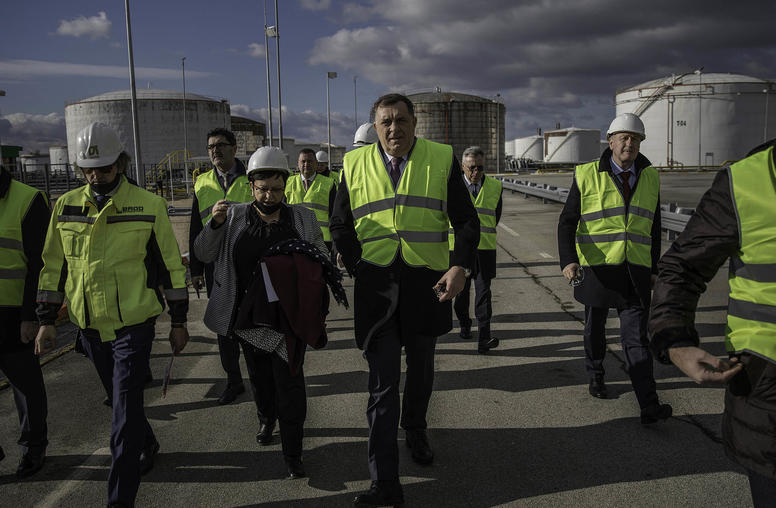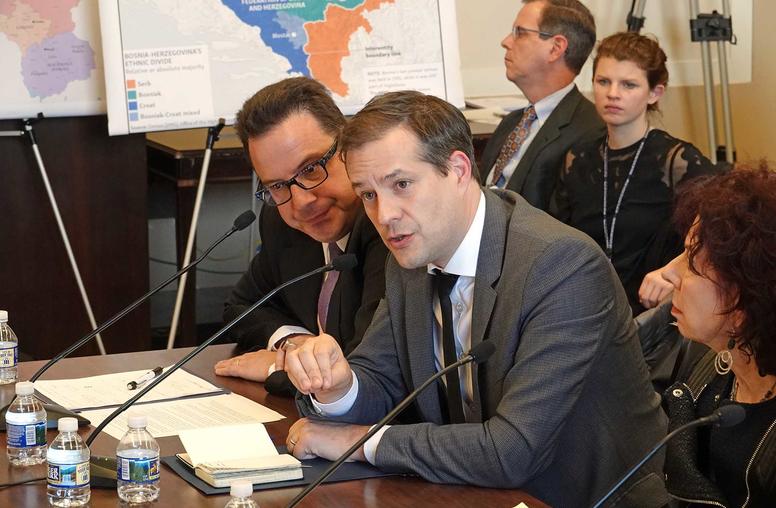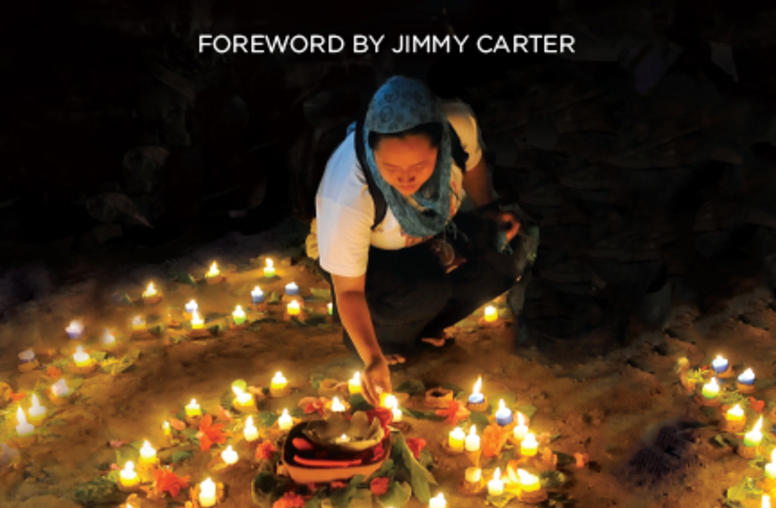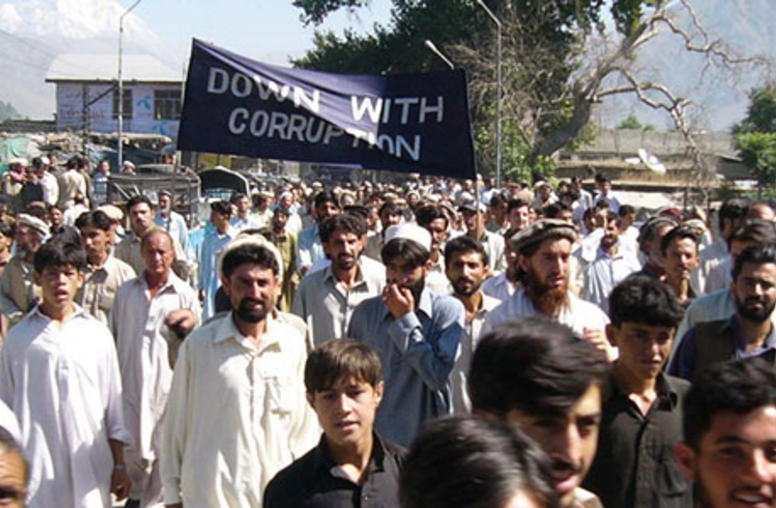Bosnia’s Protests: What Will it Take to Spur Change?
The good news about the protests that erupted in Bosnia-Herzegovina earlier this year was that they had nothing to do with ethnicity, despite lingering divides almost two decades after a war that killed some 100,000 people. But the demonstrations may do little good without political influence to spur change.
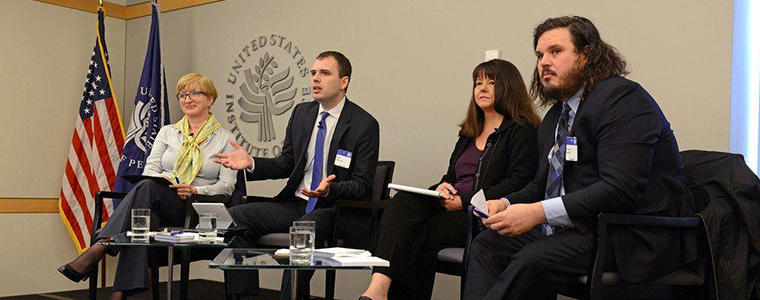
Those were some of the conclusions of a Bosnian civic activist and two other panelists in a discussion hosted by USIP on April 2 with the Emerging Democracies Institute in Washington. The session explored the ramifications of the protests for the country’s parliamentary and presidential elections in October.
The demonstrations in February started with workers in the northeastern Bosnian city of Tuzla expressing anger at the deterioration of their industries amid questionable privatizations. The discontent quickly spread to a dozen towns and cities throughout Bosnia, including the capital Sarajevo, as citizens voiced frustration at economic malaise, corruption and political stagnation.
After reports that police had begun beating protesters, the rallies in Tuzla grew violent and government buildings were torched. At least four cantonal-level governments resigned in the face of the opposition, and civic groups around the country began conducting “plenums” or forums to give voice to ordinary citizens.
But the forums have ended up more as venting sessions than effective mechanisms to achieve necessary change at the national level in Bosnia, according to Darko Brkan, founding president of a non-governmental organization in Sarajevo called “Zasto Ne” (Bosnian for “Why Not”), and Reuf Bajrovic, founder and president of the Emerging Democracies Institute. Bajrovic also is founder of a Bosnian research institute.
The root of Bosnia’s ire lies in the unwieldy, multi-layered government structures set up in the 1995 Dayton Peace Accords that ended the war, largely by seeking to parcel out power among the warring parties. The resulting Constitution also carved up the country’s presidency among the three ethnic groups, shutting out citizens who didn’t identify with any one of those categories.
USIP’s work on Bosnia in the past has included research, support for civil society and training in negotiations and diplomatic skills for staff on the ground working for the Organization for Security and Cooperation in Europe (OSCE). The Institute also has worked extensively on questions of how to prevent atrocities, including supporting the Genocide Prevention Task Force with the United States Holocaust Memorial Museum and the American Academy of Diplomacy. The task force was co-chaired by former Secretary of State Madeleine K. Albright and former Secretary of Defense William S. Cohen and resulted in a December 2008 report containing 34 recommendations.
One of the task force’s recommendations -- to create 'a dedicated, high-level interagency committee' – resulted in President Barack Obama’s 2012 announcement of the Atrocity Prevention Board. USIP also jointly organized the Working Group on the Responsibility to Protect (R2P), co-chaired by former Secretary Madeleine K. Albright and Ambassador Richard Williamson, with the United States Holocaust Memorial Museum and the Brookings Institution to increase understanding of the “responsibility to protect” against mass atrocities and identify specific steps the U.S. could take to increase the ability and will to respond in a timely manner.
The U.S., European Union and Bosnian political leaders have argued for years over whether or how to amend the constitution to distribute power more fairly and efficiently, to no avail. In the meantime, the ruling nationalist parties on each side have benefited from the status quo, and even reintroduced a kind of “creeping authoritarianism” with police brutality and arrests of protesters on extreme charges of terrorism, Bajrovic said.
“Government has been atrocious in Bosnia,” and levels of corruption are “astounding,” said Milada Anna Vachudova, an associate professor of political science at the University of North Carolina at Chapel Hill with expertise in the democratization of post-communist Europe. Bosnia’s main political parties almost seem to collude to maintain the status quo despite their outward animosities, she said.
Civil society leaders and the Bosnian public who don’t want to get involved in “dirty politics” have to realize that, while their anger at the political and economic malaise in the country is justified, “the best way to take it out is at the ballot box,” Bajrovic said.
“Civic engagement is extremely important,” Bajrovic said. “But trying to change things in the country without getting involved politics – it’s not going to happen.”
The threat of recurring protests and poll results showing most Bosnians haven’t decided which parties to support in October, as they usually would have by now, might spur some political leaders to come around, Brkan said.
“I think there’s fertile soil for actually trying to establish communication with the political parties and the government in a different way,” Brkan said.
Among the steps the U.S. and EU could take to help would be to step up pressure on the main political parties. They also should continue funding civil society organizations, research programs and media that provide vital information in transitions that clearly are incomplete, the speakers said. Vachudova cited the State Department’s Title VIII program that supported her research on the ground through the National Council for Eurasian and East European Research (NCEEER). Brkan said he listens online every morning to Radio Free Europe’s Balkans programming as a quality source of news, a program that is slated to be cut before the end of this year.
The approach of Bosnia’s neighbors, Serbia and Croatia, to the unrest has been notable, Bajrovic said. In an unusual twist, Serbia actually was more helpful than Croatia, which entered the EU last July, he said. While Croatia’s prime minister travelled to the predominantly Croat side of the western Bosnian city of Mostar, raising alarms of ethnically based interference, Serbia’s deputy prime minister and likely the next prime minister, Alexander Vucic, declined to get involved, Bajrovic said.
Viola Gienger is a senior writer at USIP.
